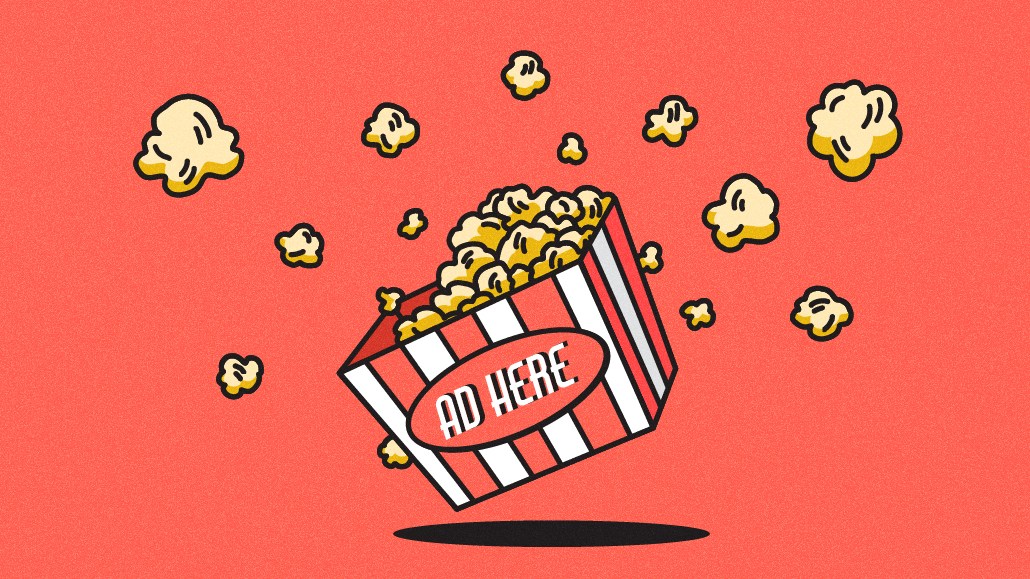Secure your place at the Digiday Media Buying Summit in Nashville, March 2-4
Will National CineMedia’s bankruptcy drag cinema advertising down with it?

In a not-unexpected move, the country’s largest cinema ad firm, National CineMedia, filed for bankruptcy on Tuesday night — ironically only days after the biggest movie opening weekend of the year, courtesy of “Super Mario Bros.”
From all reports, it looks as if NCM’s bankruptcy has more to do with debt load brought on by the shuttering of theaters during the Covid-19 pandemic and the need to restructure its capital when interest rates are high, rather than poor management, per se, agreed observers of the space. (Although prior management is missed in the marketplace — more on that below.)
Despite declaring bankruptcy, NCM plans to move ahead with operating under a debt restructure with its lenders, allowing the company to keep paying employees and forge on with its business.
“As we take this important step to restructure our balance sheet, nothing changes for us at NCM in terms of delivering best in class advertising solutions to each of our clients,” read a statement from NCM’s Chief Revenue Officer Mike Rosen. “It is business as usual as we continue to provide the impact, value, and results that our advertisers have come to expect from NCM.”
Rosen’s statement also noted that box office sales year to date are up 26% in 2023 over 2022. “We are incredibly excited about our future, and we look forward to emerging with greater flexibility to innovate and grow,” he said.
Although NCM’s main competitor Screenvision declined to comment on the news, one executive who spoke on the condition of anonymity said the news is unfortunate — but not damaging to the industry — coming just ahead of the upfront season, during which the cinema ad firms plan to participate. The exec said NCM’s bankruptcy won’t materially affect Screenvision. In fact, it could end up letting Screenvision gain a bit of ground on its larger competitor, either through ad deals or winning exclusive access to more screens.
“Mainstream movie-going behavior is back, the advertising business is recovering around that, and we’re doing just fine,” said the exec. “It’s not a rocket ship but [Screenvision’s] financial structure is good. [It’s] building back advertising sales nicely, and relationships are strengthening. There’s a lot of really nice secular tailwinds finally coming back.”
Among those secular tailwinds is the fact that the content pipeline looks like it will continue to fill (barring a writers’ strike, which could adversely affect the entire filmed content landscape from movies to TV). Apple in March announced it will release a slate of movies targeting exclusive theatrical windows first before moving to Apple TV.
And Amazon just enjoyed a larger-than-expected box office take for its theatrical release of “Air” last week.
Even David Zaslav, CEO of a merged Warner Bros. Discovery company, was quoted in a recent Wall Street Journal article declaring the theatrical business to have greater value than perceived these last two years. “There’s an ecosystem of economic return when you open something in the theaters,” he was quoted in an article citing comments he made during an analyst conference last November.
“The worst for this industry was in the thick of Covid,” agreed Barry Frey, CEO of the Digital Place-based Advertising Association. “Everyone sees that the cinema business is only going up from here — look at the ‘Super Mario Bros. Movie’ for proof. There’s strong management in this space to boot.”
That said, one executive with knowledge of the cinema ad space noted that upper management at NCM hasn’t been the same since Cliff Marks, its prior president, left in 2021. Marks had risen up the ranks at NCM for 19 years and was practically synonymous with the space.
More in Media

WTF is a creator capital market?
What is a creator capital market, what does it mean for creators looking to diversify revenue, and why is it so closely tied to crypto?

Media Briefing: Publishers explore selling AI visibility know-how to brands
Publishers are seeing an opportunity to sell their AI citation playbooks as a product to brand clients, to monetize their GEO insights.

Creators eye Snapchat as a reliable income alternative to TikTok and YouTube
Figuring out the Snapchat formula has been very lucrative for creators looking for more consistent revenue on a less-saturated platform.








